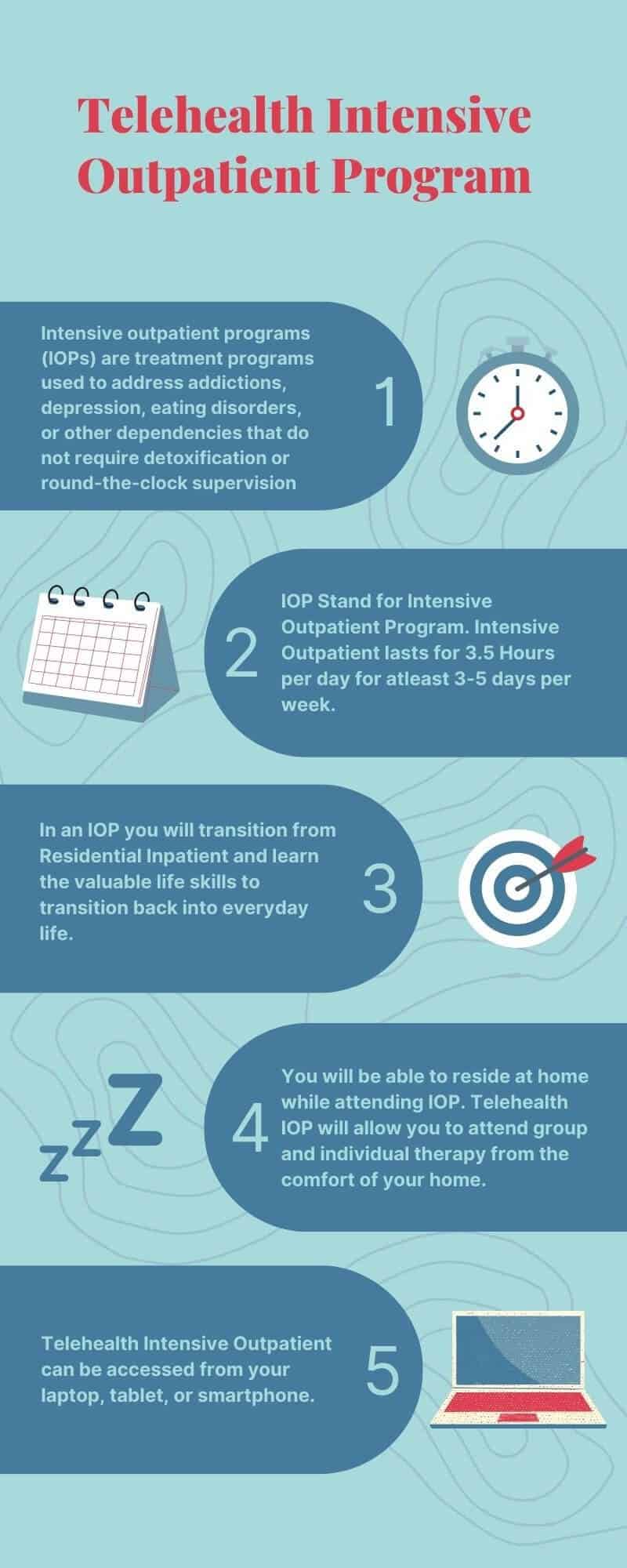Professional Tips for Discovering the very best Intensive Outpatient Program (IOP).
Professional Tips for Discovering the very best Intensive Outpatient Program (IOP).
Blog Article
Navigating the Complexities of Twin Diagnosis Therapy Within an Extensive Outpatient Program Setting
In the world of mental health and wellness and dependency therapy, the intersection of double medical diagnosis presents a nuanced difficulty that requires an extensive and customized strategy. Within the confines of an Extensive Outpatient Program (IOP) setup, the complexities of resolving co-occurring mental health and wellness disorders and substance use disorders call for a fragile equilibrium of experience and resources to navigate. The assimilation of evidence-based techniques, collective initiatives amongst multidisciplinary groups, and an eager understanding of the one-of-a-kind needs of each individual are crucial components in successfully taking care of double medical diagnosis within an IOP framework. By checking out the ins and outs of twin medical diagnosis therapy within this intensive outpatient context, a clearer course emerges in the direction of alternative and lasting recuperation for those grappling with these linked challenges.
Double Medical Diagnosis Summary

Understanding double medical diagnosis is crucial as it needs a thorough and incorporated strategy to therapy. By acknowledging the interplay between substance usage and mental health and wellness, doctor can customize treatments to meet the unique requirements of each individual. This alternative technique not only addresses signs and symptoms but likewise targets hidden aspects that add to the double diagnosis.
Moreover, without treatment double diagnosis can lead to a cycle of regression and intensifying psychological wellness signs and symptoms. By identifying the complexity of twin medical diagnosis and offering customized treatment, healthcare professionals can support individuals in achieving lasting recuperation and enhanced psychological health.
Tailored Therapy Strategies
Acknowledging the elaborate interaction between substance use problems and mental health problems, the growth of tailored treatment strategies is critical in attending to the complexities of twin diagnosis in mental health and wellness treatment. Tailored therapy strategies are personalized methods that think about the one-of-a-kind requirements, challenges, and goals of people dealing with twin diagnosis. These strategies are made collaboratively by a multidisciplinary team of professionals, including psychiatrists, psychologists, social workers, and dependency professionals, to guarantee comprehensive and integrated care.
Tailored treatment strategies commonly include a mix of therapies, medicines, and behavior treatments that target both the compound usage disorder and the mental health condition simultaneously. These plans might consist of cognitive-behavioral treatment, dialectical behavior modification, medication-assisted therapy, individual counseling, team treatment, and family members treatment, to name a few evidence-based treatments. By personalizing treatment strategies to specific circumstances, tailored plans can resolve the origin creates of dual diagnosis, promote long-lasting healing, and boost total lifestyle for individuals battling with co-occurring disorders.
Integrated Care Strategy
An incorporated care technique in twin medical diagnosis therapy incorporates clinical, mental, and social treatments to attend to the complex requirements of people with co-occurring material usage problems and psychological health and wellness problems. This method recognizes that dealing with one facet of a dual diagnosis without addressing the other can bring about ineffective outcomes. By incorporating clinical treatments such as medicine administration for psychological health and wellness conditions with psychological therapies like cognitive-behavioral therapy for material use conditions, people obtain comprehensive treatment that targets all aspects of their double medical diagnosis.
In addition, the social element go to these guys of integrated care includes dealing with ecological elements that might contribute to the advancement or perpetuation of substance usage and mental health concerns. This can include household characteristics, real estate instability, or lack of social support. By incorporating social interventions like look at here now household therapy, trade assistance, and neighborhood resources, the treatment comes to be more all natural and customized to the person's particular requirements. In general, an incorporated treatment approach in dual medical diagnosis treatment within an intensive outpatient program setup intends to provide detailed, efficient, and personalized like individuals dealing with co-occurring disorders.
Challenges in IOP Establishing
In the context of dual diagnosis therapy within an extensive outpatient program, browsing the intricacies of co-occurring compound usage disorders and psychological wellness problems presents significant challenges. One of the key obstacles in the IOP setup is the control of care in between psychological wellness specialists and chemical abuse professionals to make sure a thorough treatment approach. This calls for effective interaction, cooperation, and a deep understanding of just how these conditions connect and affect each other.

Additionally, addressing preconception and resistance to therapy within the IOP setup can hamper progression. Some individuals may be hesitant to divulge their double diagnosis or might feel ashamed, preventing their engagement in the restorative process. Getting rid of these obstacles requires a supportive and non-judgmental environment that promotes trust fund and openness.

Collaborative Expert Initiatives
Effective twin medical diagnosis treatment in an extensive outpatient program requires seamless cooperation among psychological health and wellness professionals and compound abuse professionals to guarantee a comprehensive and incorporated method to care. By functioning together, these specialists can produce individualized therapy plans that provide to the unique demands of each client, taking into consideration both their mental wellness and substance misuse challenges.
Collective initiatives additionally prolong to regular communication and info sharing amongst group participants to make certain a natural therapy approach. Ultimately, a united front of experts working together improves the efficiency of double medical diagnosis therapy within an extensive outpatient program.
Final Thought
In verdict, reliable twin medical diagnosis therapy within an extensive outpatient program setup needs customized treatment plans and an integrated care method. Challenges may occur in this setting, but collaborative efforts amongst professionals can aid browse these intricacies. By addressing the unique demands of people with co-occurring psychological wellness and material utilize conditions, IOP programs can supply detailed and all natural treatment to support healing and overall well-being.
Report this page